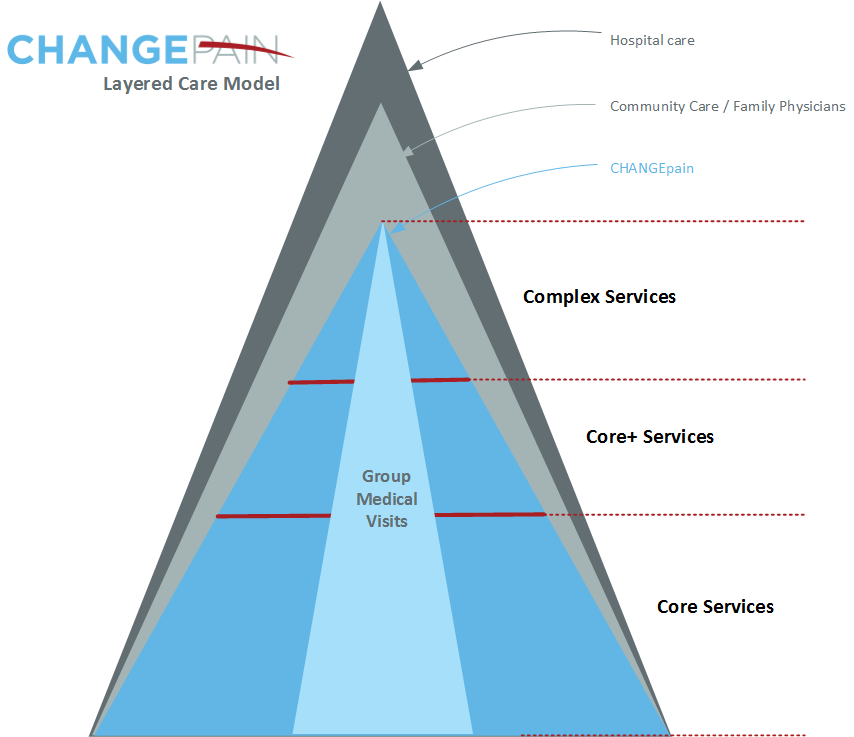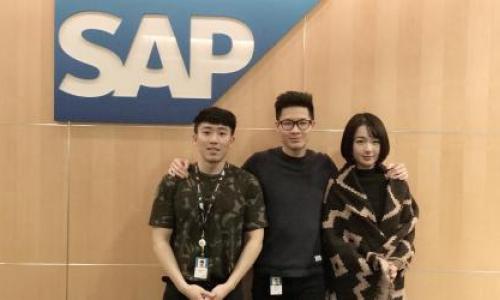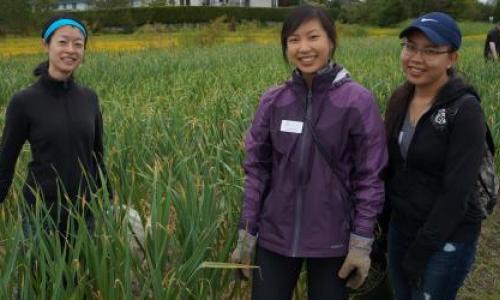
CHANGEpain Clinic was founded in 2013 by pain specialist, Dr. Brenda Lau and general practitioner, Dr. Greg Siren. The clinic’s layered care approach is interdisciplinary in nature and encompasses assorted services such as physiotherapy, naturopathy, occupational therapy, and various group medical visits that are led by diverse professionals including a yoga and Pilates specialist, a naturopathic doctor, and a registered nurse. Patients need to be referred to the clinic by their family physician. Once a referral is completed, the patient is asked to complete an online intake form outlining their medical history. They are then placed in the CORE program followed by a series of five appointments with a CORE physician. Services provided in the CORE program are covered by the Medical Services Plan (MSP). If treatments provided in the CORE program are deemed to be unsuccessful by a CORE physician, the patient may be referred to the CORE+ or COMPLEX program. Services provided in these programs are generally not covered by MSP.

The main treatment included in the CORE program is Trigger Point Injections (TPI). CORE+ services include Intramuscular Stimulation (IMS), occupational therapy, physiotherapy, and individualized pain navigation programs. COMPLEX services include a consultation and treatments with a pain specialist, the Integrated Specialist Interventions Targeted by Enhanced Sonograms (iSITES) program, infusion therapy, multidisciplinary team assessments and recommendations, and individualized pain packages.
As a fourth year Biomedical Physiology student, I decided to apply to CHANGEpain Clinic as I hoped to apply my classroom learning in a clinical setting and further strengthen my studies. I was also wishing to work closely with physicians as I hope to pursue a career in medicine. The following highlights my co-op experience at CHANGEpain Clinic.
Preparing for Your Interview
It was a great feeling being selected for an interview at a prestigious workplace such as CHANGEpain Clinic. Prepping for the interview was a lengthy process because I did not know what to expect. Unfortunately, I was unable to speak to any previous students who had completed a co-op placement at the clinic; therefore, I had to prepare myself for any type of question that may be asked. I made sure I had a strong understanding of the clinic's foundation, its founders, and the type of treatments that were offered at the clinic. I also Googled the individuals who were going to be part of the interview. This provided me with insight about the roles of these individuals at the clinic. My advice would be to take the extra time to prep for the interview even though it may seem tedious. Sit in front of a mirror and answer practice questions or have a friend complete a mock interview with you.
The First Week
Not going to sugarcoat it, the first week was busy. There was a lot of material that needed to be solidified before I could chronicle on my own. The clinic was very fast-paced as well; therefore, it was important to comprehend the workflow of the clinic, in order to be efficient. I made sure I asked a lot of questions to ensure that I was on the right track during training. As a student, it may seem like you're being a nuisance or disrupting your superior's work if you reach out to seek clarification. However, I believe employers appreciate when an employee takes the time to ask questions. This illustrates that the employee is keen to learn and is willing to speak up when he or she is uncertain about something.
What Working as a Clinical Chronicler Encompasses
As a Clinical Chronicler I completed various tasks. My main task was to chronicle the history of new patients, update the chart notes of returning patients, and note the type of treatment being administered during the appointment, along with the specifics of what regions were treated and what material was used for the procedure. When working with certain physicians who performed specific treatments, I would take notes during those appointments, prep their syringes, and discard used material. While chronicling took up around 75% of my time during the week, the role of a Clinical Chronicler also involved administrative tasks. These tasks included answering phones, booking appointments, assisting patients with their intake questionnaires, and filing electronic faxes and scans.
Reaffirming My Career Choice and Beyond
Working at CHANGEpain Clinic broadened my understanding of the different types of jobs that exist in the medical field. My goal is to become a physician, however, working at the clinic has provided me with insight about different job opportunities I can start considering as part of my back-up plan. Previously, I wished to pursue a career in family practice medicine. Working at the clinic has allowed me to assess the pros and cons of completing further training and becoming a specialist. Simply, CHANGEpain Clinic helped to confirm my desire to follow a career in medicine, but the experience helped me realize that I would be more satisfied if I took the extra few years to specialize in a field that I am passionate about.
Advice for Prospective Co-op Students
All in all, Co-operative Education is amazing for many reasons. It allows students to take what they learn in the classroom setting and experience it in a professional setting. Further, taking on a job that is relevant to one’s degree as a student, not only gives one a competitive edge after graduation, it also helps one grow as an individual and provides insight about career options after completing a degree. My co-op experience was truly enriching. Bottom line: If you are reluctant to participate in co-op, you shouldn’t be! Simply start applying to jobs, be patient if you aren’t successful at first, and look forward to the amazing experience ahead.
Beyond the Blog
-
Find out more about CHANGEPain Clinic by visiting their website.














